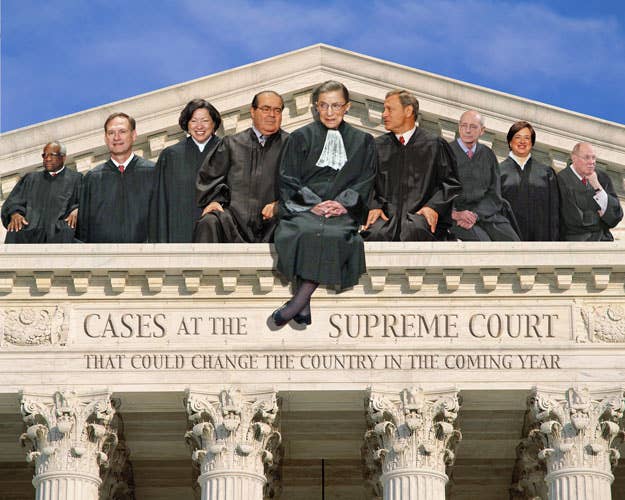
WASHINGTON — At 10 a.m. Monday, in the midst of a government shutdown, Chief Justice John Roberts will begin his eighth term at the Supreme Court — beginning a session in which the justices are slated to hear cases affecting the future of legislative prayers, presidential power in making appointments, and whether a meth addict can have a court-ordered mental evaluation used against him in fighting murder charges.
As court-watchers wonder what the term will hold for the future of Justice Ruth Bader Ginsburg and the legacy of retired Justice Sandra Day O'Connor, the justices themselves are preparing for a term that, at the outset, appears to focus on revisiting — and possibly overruling — some precedents established in past decades and considering anew issues at the outer limits of the powers of the three branches of government.
In the first week of the term, the justices will hear a challenge to campaign finance contribution limits. The next week, a Michigan amendment that bars affirmative action in higher education admissions will be at the center of the court's attention.
Other cases will address whether the impact of housing development decisions can violate the Fair Housing Act and whether roommates can authorize a police search later used against a tenant who previously objected to the search but is no longer there. The Massachusetts law creating a "buffer zone" around reproductive health clinics is being challenged in another case, and the limits of congressional power in enforcing treaties is at question in a case involving the Chemical Weapons Convention.
The incentives against lawsuits enforcing patent rights are at issue in a case that some say could affect the future of innovation in America, and another case about the role of bankruptcy judges — who are not lifetime-tenured judges — could impact the future role of those lifetime-tenured Article III judges.
Here are 11 cases that could change the way America and the government work in the coming year:
1. Presidential Recess Appointments: National Labor Relations Board v. Noel Canning

This case appears to be a courtroom-based continuation of ongoing partisan fighting in a city currently in shutdown mode. And the decision could dramatically alter the balance of power between the president and Congress in the ever-present nominations fight. In answering whether President Obama had the authority to make so-called "recess appointments" of people to the National Labor Relations Board during "pro forma" sessions of the Senate in which no business was to be conducted in January 2012, the D.C. Circuit Court of Appeals held that he did not.
In a broad ruling, the judges said that the Constitution's "recess appointment" clause — which allows presidents to fill vacancies temporarily that otherwise would need Senate approval during Senate recesses — only applies to the "intersession" recess between sessions of Congress and not "intrasession recesses" taken during a session of Congress. Although that opinion could have found against Obama's decision on a more limited reasoning that the Senate was not actually recessed during a time when it held "pro forma" sessions, the D.C. Circuit issued the broader reasoning in its ruling.
The justices took the case and, if the D.C. Circuit's reasoning becomes the law of the land, could create a significant change in the way nomination battles are fought in D.C.
2. Campaign Finance "Aggregate" Limits: McCutcheon v. Federal Election Commission

On Tuesday, the justices will consider whether "aggregate" limits faced by political donors are constitutional. Beyond the normal contribution limits, the aggregate limits — $48,600 to candidate committees and $74,600 to non-candidate committees like political parties — are limits on overall contributions to any federal candidates or non-candidate committees within an election cycle.
The Federal Election Commission argues that there has been a different standard applied to contributions than to campaign expenditures since the Supreme Court upheld the post-Watergate federal campaign finance law. Shaun McCutcheon and the Republican National Committee, with support from campaign finance restriction foe Sen. Mitch McConnell, say that distinction should be tossed out by the court or, at least, should nonetheless mean the aggregate limit is unconstitutional.
A broad array of groups has argued in support of the limits, and Public Campaign released a report last week showing how eliminating the limits would, primarily, benefit wealthy, white men. In the shadow of Citizens United, though, supporters of campaign finance restrictions are nervous. As law professor Rick Hasen has written, given the other members of the court, "Liberals have to hope [Chief Justice John] Roberts will show some restraint."
3. State Affirmative Action Bans: Schuette v. Coalition to Defend Affirmative Action
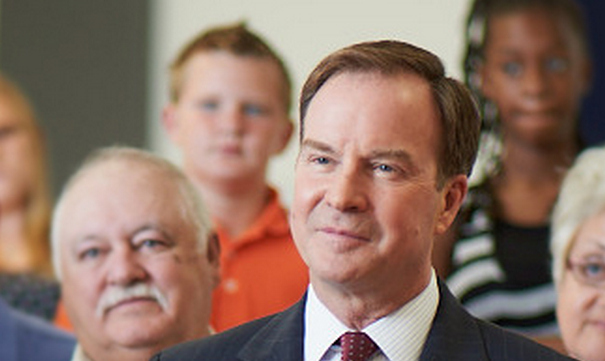
Next week, the Supreme Court will hear the latest in a long and divisive run of affirmative action cases. In the court's last term, it made clear that institutions that choose to use any form of affirmative action in higher education admissions need to show, under the tough "strict scrutiny" standard, that the plan is necessary to create a diverse student body. Now the court is considering the other side of that question: Does it violate the Constitution's guarantee of equal protection when a state bans such considerations in public-university admissions across the state through a constitutional amendment?
Justice Elena Kagan is not participating in the case, but a 4-4 decision would mean the Sixth Circuit's decision holding the ban unconstitutional would stand, so supporters of the amendment need at least five votes to uphold the amendment. The opponents of the amendment argue, in part, that the "political restructuring" of banning race and sex considerations by amendment limits considerations of those factors in a way that no other factor is limited and, as such, is unconstitutional. Proponents say, to the contrary, that this amendment is, by its terms, nondiscriminatory and could never violate the Constitution.
If the ban is upheld, as many observers expect, expect the foes of affirmative action to turn their attention to forcing other states to follow, and to further limit the scope of affirmative action.
4. Reproductive Health Clinic Buffer-Zone Law: McCullen v. Coakley

In its January decision upholding the Massachusetts law that bans anti-abortion protesters — that is, anyone other than employees, police, and others with a reason to be there — from entering a 35-foot "buffer zone" around the entrance and exits of such facilities, the 1st Circuit judges were clearly frustrated with the challenge: "This case does not come to us as a stranger."
"The plaintiffs have also marshaled other recent Supreme Court cases in their ambitious effort to reinvent First Amendment doctrine," Judge Bruce Selya wrote of the First Amendment arguments put forth by opponents of the buffer zone. "For present purposes, it suffices that these decisions, by no stretch of even the most fertile imagination, sully either the reasoning or the doctrinal infrastructure of [the court's earlier decision upholding the law]." Now however, the Supreme Court will examine whether the law is different from a 2000 decision upholding a Colorado buffer zone and, more broadly, whether that decision should be limited or overruled.
5. Scope of The Fair Housing Act: Mount Holly v. Mt. Holly Gardens Citizens in Action

The question before the justices with regards to the New Jersey town of Mount Holly is very direct: Can so-called claims about unintentional discrimination still be violations of the Fair Housing Act? Those so-called "disparate impact" claims are raised in those circumstances in which racial or other discrimination may not have been the purpose of a given rule or policy but in which the effect of the rule or policy "disproportionately affects or impacts one group more than another," as the Third Circuit Court of Appeals held in finding that the Fair Housing Act can be violated by a policy with such a "disparate impact."
The Supreme Court took the case, and part of the underlying question the justices will consider is whether it should defer to the Housing and Urban Development Department's policy that such "disparate impact" cases are allowed under the law.
6. Power of Congress to Enforce Treaties: Bond v. U.S.

Carol Bond's case presents one of the more colorful disputes before the court this term, as she is being charged with violating the Chemical Weapons Convention Implementation Act for, as her lawyer put it to the court, a "domestic dispute, arising out of marital infidelity and culminating in a thumb burn." Bond, when she found out that her husband was having a child with another woman, secured and placed potassium dichromate and an arsenic-based chemical throughout the other woman's house. The lawyer writes that the other woman "avoided the easy-to-spot chemicals (potassium dichromate is bright orange) on all but one occasion," in which she received a minor burn on her thumb.
She was, nonetheless, charged with violating the law that Congress passed in enforcing the Chemical Weapons Convention, and now the Supreme Court will be considering the far larger question raised in a 2005 law review article by law professor Nicholas Rosenkranz of whether Congress is limited by its other constitutional restrictions on federal power in the legislation it passes to enforce treaties.
7. Legislative Prayer: Town of Greece v. Galloway
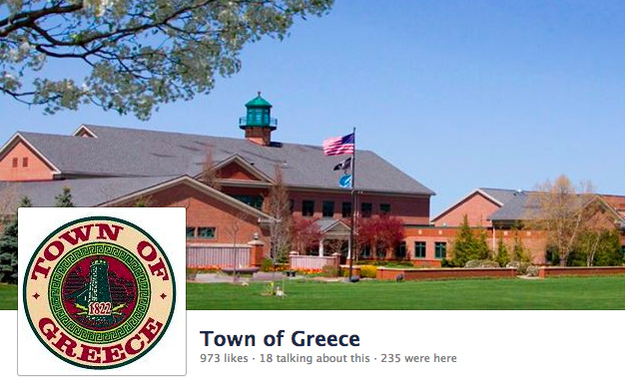
The Second Circuit Court of Appeals, in a decision by Judge Guido Calabresi, held last year that the town of Greece, New York, opened its monthly board meetings with a "prayer practice" that "impermissibly affiliated the town with a single creed, Christianity," which will be considered by the justices in November in an appeal by the town. The lawyers for Susan Galloway and Linda Stephens argue that the case is about coercion: "This case is not about the ability of legislators to acknowledge God or seek divine guidance. It is about the right of citizens to participate in local government without being required to participate in sectarian prayers."
The Obama administration, backing the town of Greece, disagrees, arguing instead that the Supreme Court's 1983 decision in Marsh v. Chambers makes clear that the long history of such legislative prayers in the country serves as convincing evidence that such prayers do not violate the Establishment Clause.
8. Scope of Article III Judicial Power: Executive Benefits Insurance Agency v. Arkison
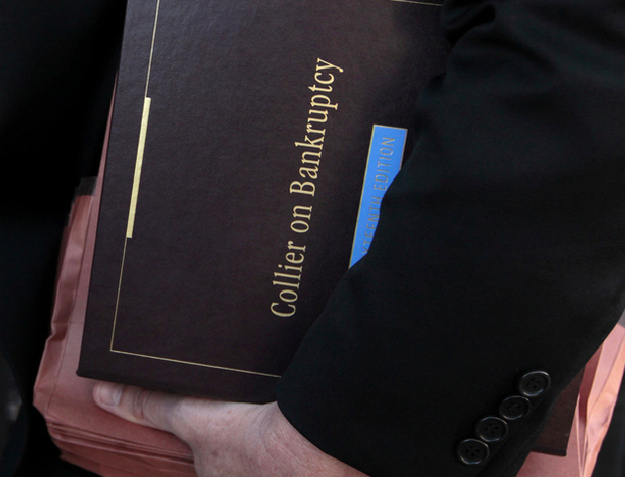
Along with the recess appointment case testing executive power and the chemical weapons treaty case testing legislative power, a third case tests the extent of judicial power in the context of bankruptcy judges. Under Article III of the Constitution, only judges appointed by the president with the advice and consent of the Senate and who are given lifetime tenure can exercise the "judicial power" of the United States. Many federal officials with the title of "judge" — including immigration judges, court of claims judges and bankruptcy judges — do not meet this standard and, as such, cannot exercise judicial power except in limited circumstances.
This case raises the question of whether parties in bankruptcy court can choose to allow the bankruptcy judge to exercise such authority anyway. The case also will look at what type of decisions can be made, given the limits on a bankruptcy judge, in a bankruptcy proceeding. A decision narrowing the power of bankruptcy judges could have the impact of either increasing Article III judicial power or overburdening Article III judges, depending on one's vantage-point.
9. Self-Incrimination: Kansas v. Cheever

Scott Cheever, a long-time meth user, shot and killed a Kansas sheriff who had gone to his house to arrest him. Cheever argued at trial that, due to his meth abuse, he did not have the ability to "form[] the premeditation that is a requisite element of capital murder." The state prosecutor then called a psychiatrist who had examined Cheever under court order when the case had been in federal court to rebut the defense. The Supreme Court will now consider whether a state violates a defendant's Fifth Amendment rights against self-incrimination when introducing evidence from a court-ordered mental health examination to rebut a mental health experts testimony abut the defendant lacking the required mental state to commit the crime in question.
Although the Obama administration, represented by Solicitor General Donald Verrilli, has weighed in on Kansas' side in the case, one interesting element of the oral arguments on Oct. 16 will be that Cheever is being represented by Neal Katyal, who served as the administration's Supreme Court lawyer until Verrilli took over in June 2011.
10. Attorney Fees in Patent Litigation: Octane Fitness v. Icon Health and Fitness
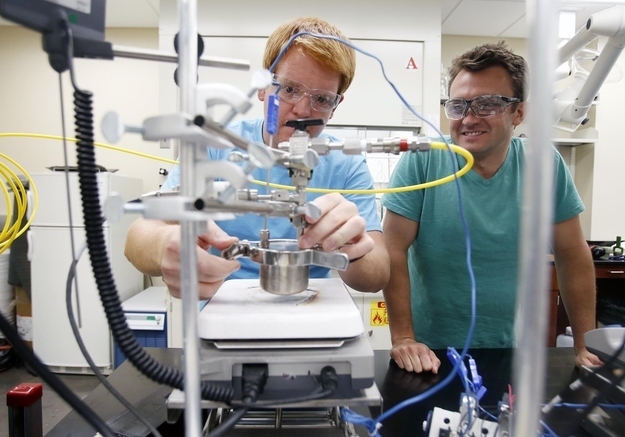
When patent holders sue claiming an infringement of their patent, the Federal Circuit has put in place "a rigid and exclusive two-part test for determining whether a case is 'exceptional'" that makes it difficult for accused infringers to recover attorney fees even if they succeed. The Supreme Court is considering whether this test "rais[es] the standard for accused infringers (but not patentees) to recoup fees" in a way that wrongly takes the authority away from the trial-court judge. Supporters of overturning the Federal Circuit's rule say it does improperly take away judges' authority and, moreover, add that such a rule discourages innovation.
11. Co-Occupant Consent: Fernandez v. California

The Supreme Court has previously said that, if two people live together, the police cannot use the results of the search against the first person if that person is present and refuses to allow the police to search the home but then the second person consents to the search. The question raised in Walter Fernandez's case is: What happens if the first person is not physically present but previously refused to give permission?
Four Runners-Up:
Management Deals with Unions - Unite Here Local 355 v. Mulhall
Air Standards - American Lung Association v. EME Homer City Generation / Environmental Protection Agency v. EME Homer City Generation
Preemption, in a Dispute over a Frequent Flyer Program - Northwest v. Ginsberg
Challenging Seizure of Assets Post-Indictment - Kaley v. U.S.
Five Issues In The Pipeline:
Abortion-Inducing Drug Limits - Cline v. Oklahoma Coalition for Reproductive Justice (accepted by the Supreme Court for review, but currently on hold because the court sent a question to the Oklahoma Supreme Court for review before it considers the case)
Obama Administration Contraception Mandate - several cases
Religious Liberty and Non-Discrimination Laws - Elane Photography v. Willock
Cell Phone Search After Arrest - multiple cases
Presidential Protests - Wood v. Moss
